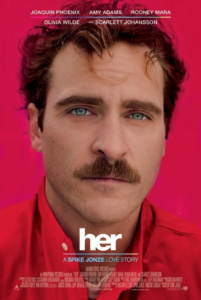
 Can a man fall in love with his computer operating system? If the operating system has the voice of Scarlett Johansson, maybe he can.
Can a man fall in love with his computer operating system? If the operating system has the voice of Scarlett Johansson, maybe he can.
Filmmaker Spike Jonze, who wrote and directed “Her,” makes challenging and often wonderful films. His “Adaptation.” was a unique take on Susan Orlean’s non-fiction book “The Orchid Thief.” Adding to the eclectic nature of that production, “Adaptation.” was written with screenwriter “brothers” Charlie and Donald “the fictitious twin” Kaufman (look it up). Jonze’s truly unique “Being John Malkovich” is one of my favorite films. But trusting Jonze and his narratives can be difficult–you must stay on your toes.
“Her” is not for everyone. It will divide viewers sharply. For me, not enough happens and the most interesting bits are left on the table.
With “Her,” Jonze works from his own script telling the story of a sensitive letter writer named Theodore (played by Joaquin Phoenix) who, while in the throws of a bad divorce, decides to take a chance on a new artificial intelligence. The “AI” called Samantha (Johansson), referred to in the film as an “OS,” grows intellectually similar to a human being. In time, Theodore and Samantha become romantically involved.
Something is missing in his life and it’s missing in the film as well.An edgy idea, “Her” is romantic and, at times, it approaches profound questions, but sadly, the film just doesn’t go anywhere. Buffeted by its setting in an interesting near future time, “Her” has the feel of something from Terrence Malick (see “To The Wonder”) with a meandering story that tries to question the nature and definition of true love. The morose handling of the narrative exposes Theodore’s longing and depression, which is mildly interesting, but not very entertaining. Phoenix is solid in the role, but isn’t given much to do except look sullen even when trying on lovesick. Sure, movies that tackle big questions can be subtle and fulfilling, but “Her” will be hard to shake the “bore factor.”
The problem with the film is the inherent limitation imposed by the story and visual scope. At times, “Her” is like the “Hobbit” without the dragon. So much of the time, Theodore is shown talking to nothing. That’s right, nothing other than his small handheld and an earpiece. It is as if a computer generated character has not been added in post-production. Jonze knows this is a problem and in one scene introduces a physical incarnation of Samantha. I won’t spoil it for you, but this intriguing sequence introduces the concept of people who give themselves completely over to technology permitting their actions to be dictated by the OS. Wow! A human marionette.
Unfortunately, “Her” is a beautiful looking film filled with many provocative ideas and the most interesting ones are left unexplored. For example, Theordore has a job writing personal letters for clients. He dictates them to his computer which then “writes” them in what appears to be the handwriting of the client. These intimate letters would be the property of the client and legally be a work for hire. And yet, in “Her” the letters are somehow the copyrighted (or co-authored) material of Theodore. How does that work? The intriguing thing here is the confidential relationship between the client and the letter writer. Theodore would learn very personal things about his clients, and how he internalizes this is part of the “Her” narrative. But how the film uses this device is unsatisfying–a convenient plot point helping to bring the film to a close. It is abrupt and rushed in a film that spends so much time developing the relationship through talk, talk, talk.
At one point there was buzz that Scarlett Johansson could be nominated for an Oscar, even though she does not physically appear, other than her voice, in the film. But fellow film critic Jeff Marker points out in his review that Samantha Morton voiced to the character on set when Joaquin Phoenix performed the role. Obviously, Morton’s performance would have to be factored in if awards consideration was given to what we see in the finished film. And how intriguing it would have been for Morton to show up as the physical incarnation of Samantha. Also, consider how manipulative it is for Morton to be dropped after-the-fact in favor of the arguably more “attractive” Johansson. This may have been a pretentious marketing ploy, but I’ve not read enough to comment more fully on the subject.
I just don’t know, a movie like this, directed by a director who wants to constantly challenge his audience, should have challenged us a little more with all of the intriguing ideas the filmmaker introduces. But, maybe I'm complaining about too much of a good thing. The performances here are wonderful. The cinematography is excellent. And my brain was on fire thinking about all the different ideas being floated around. It’s just that the ideas Jonze chooses to explore fully are not the ones that I found most interesting. Ultimately, it’s all a matter of what floats your boat. And “Her” left my boat moored at the dock.
